by Gillian Flaccus
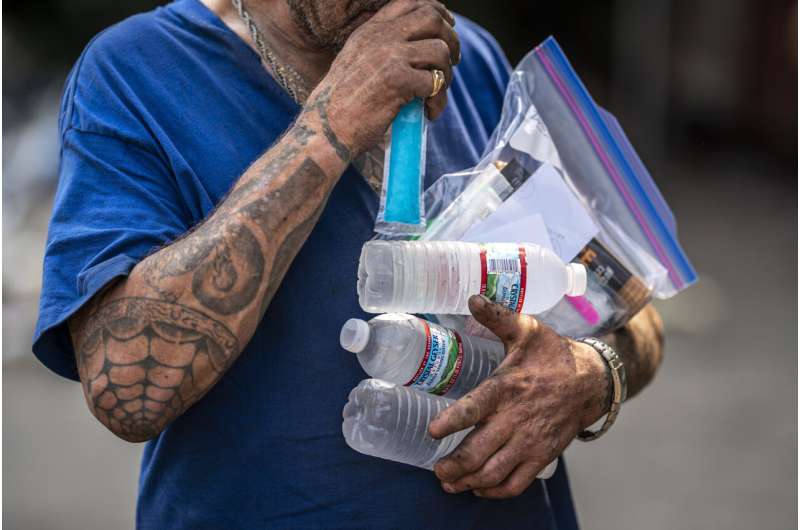
Chad Messenger collects cooling supplies including bottled water donated by the Cascadia Behavioral Healthcare's street outreach team on Thursday, Aug. 12, 2021, in Portland, Ore. Credit: AP Photo/Nathan Howard
Temperatures were expected to soar to triple digits again Friday in Portland, Oregon, and Seattle as a heat wave bakes the Pacific Northwest, and forecasters said hot weather and wildfire smoke would pose a problem through the weekend.
An air quality alert was issued through Saturday night for much northwestern Washington because of smoke drifting in from blazes in British Columbia and eastern Washington. However, forecasters said the hazy sky could drop temperatures slightly lower than predicted Friday and Saturday.
Temperatures reached 103 F (39 C) on Thursday in Portland and the 90s in Seattle. In Bellingham, Washington, the high hit 100 F (38 C) for the first time on record. It's the second major heat wave in less than a month in a normally temperate region where many don't have air conditioning. Record-breaking hot weather in late June caused hundreds of deaths in Washington state, Oregon and British Columbia when the thermometer went as high as 116 F (47 C).
A detailed scientific analysis found the June heat was virtually impossible without human-caused climate change. Meteorologist Jeff Masters with Yale Climate Connections said a similar study would need to be done with other heat waves, but there's a general link between global warming and worsening heat waves.
Temperatures were expected to soar to triple digits again Friday in Portland, Oregon, and Seattle as a heat wave bakes the Pacific Northwest, and forecasters said hot weather and wildfire smoke would pose a problem through the weekend.
An air quality alert was issued through Saturday night for much northwestern Washington because of smoke drifting in from blazes in British Columbia and eastern Washington. However, forecasters said the hazy sky could drop temperatures slightly lower than predicted Friday and Saturday.
Temperatures reached 103 F (39 C) on Thursday in Portland and the 90s in Seattle. In Bellingham, Washington, the high hit 100 F (38 C) for the first time on record. It's the second major heat wave in less than a month in a normally temperate region where many don't have air conditioning. Record-breaking hot weather in late June caused hundreds of deaths in Washington state, Oregon and British Columbia when the thermometer went as high as 116 F (47 C).
A detailed scientific analysis found the June heat was virtually impossible without human-caused climate change. Meteorologist Jeff Masters with Yale Climate Connections said a similar study would need to be done with other heat waves, but there's a general link between global warming and worsening heat waves.
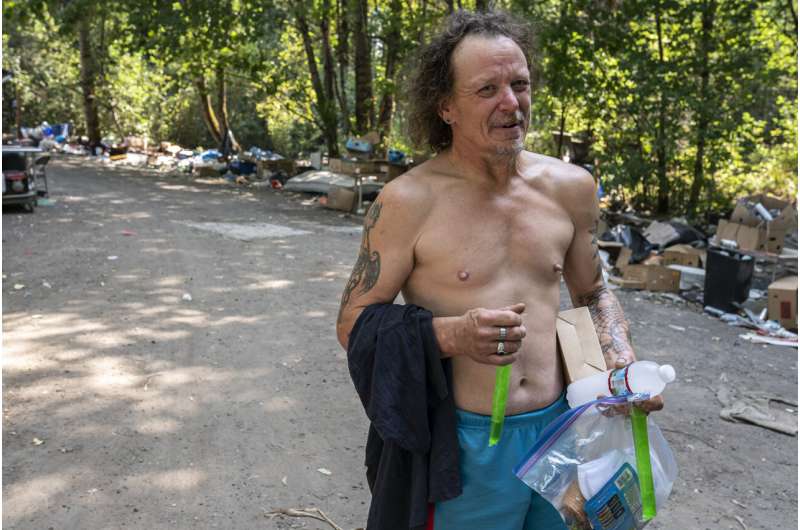
Scott Zalitis carries freezer pops and water provided by Cascadia Behavioral Healthcare's street outreach team on Thursday, Aug. 12, 2021, in Portland, Ore. People have headed to cooling centers as the Pacific Northwest began sweltering under another major, multiday heat wave. Credit: AP Photo/Nathan Howard
"If you increase your baseline temperature, you great increase your odds of extreme heat events," said Masters, co-founder of the private Weather Underground company.
Much of the Northwest was under an excessive heat warning through Saturday. The National Weather Service said heat advisories and warnings were also in effect from the Midwest to the Northeast and mid-Atlantic through at least Friday.
Oregon Gov. Kate Brown has declared a state of emergency and activated an emergency operations center. City and county governments have opened cooling centers, extended public library hours and waived bus fare for those headed to cooling centers. A 24-hour statewide help line will direct callers to the nearest cooling shelter and offer safety tips.
Authorities scrambled to provide relief to the vulnerable, including low-income older people and those living outdoors. Oregon volunteers handed out water, portable fans, popsicles and information about cooling shelters to homeless people living in encampments along the Columbia River on the outskirts of Portland.
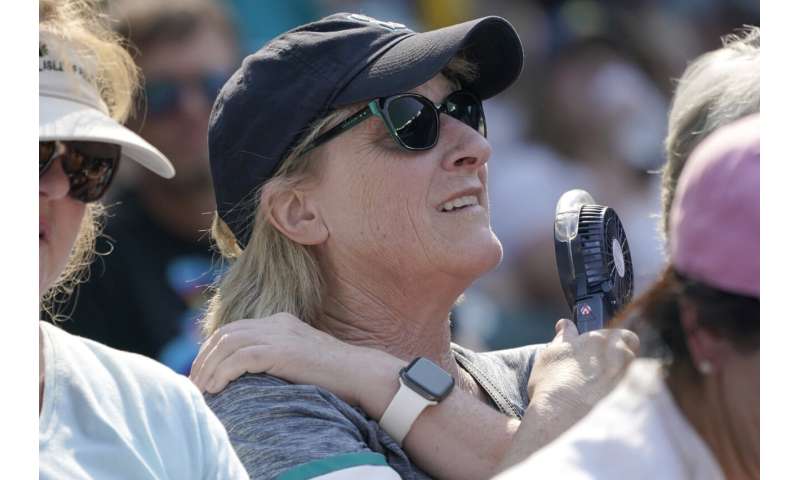
"If you increase your baseline temperature, you great increase your odds of extreme heat events," said Masters, co-founder of the private Weather Underground company.
Much of the Northwest was under an excessive heat warning through Saturday. The National Weather Service said heat advisories and warnings were also in effect from the Midwest to the Northeast and mid-Atlantic through at least Friday.
Oregon Gov. Kate Brown has declared a state of emergency and activated an emergency operations center. City and county governments have opened cooling centers, extended public library hours and waived bus fare for those headed to cooling centers. A 24-hour statewide help line will direct callers to the nearest cooling shelter and offer safety tips.
Authorities scrambled to provide relief to the vulnerable, including low-income older people and those living outdoors. Oregon volunteers handed out water, portable fans, popsicles and information about cooling shelters to homeless people living in encampments along the Columbia River on the outskirts of Portland.

A fan at T-Mobile Park keeps cool with a portable fan during a sunny day baseball game between the Seattle Mariners and the Texas Rangers, Thursday, Aug. 12, 2021, in Seattle. The usually temperate Pacific Northwest region entered the peak days of a scorching heat wave Thursday. Credit: AP Photo/Ted S. Warren
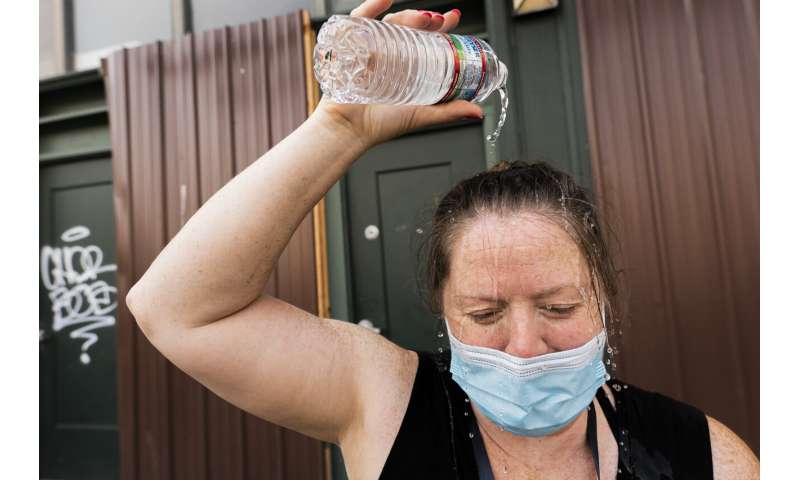

Darlene McApline, an administrative coordinator with Cascadia Behavioral Healthcare's street outreach team, dumps a bottle of water on her head to cool off while loading supplies on Thursday, Aug. 12, 2021, in Portland, Ore. Credit: AP Photo/Nathan Howard
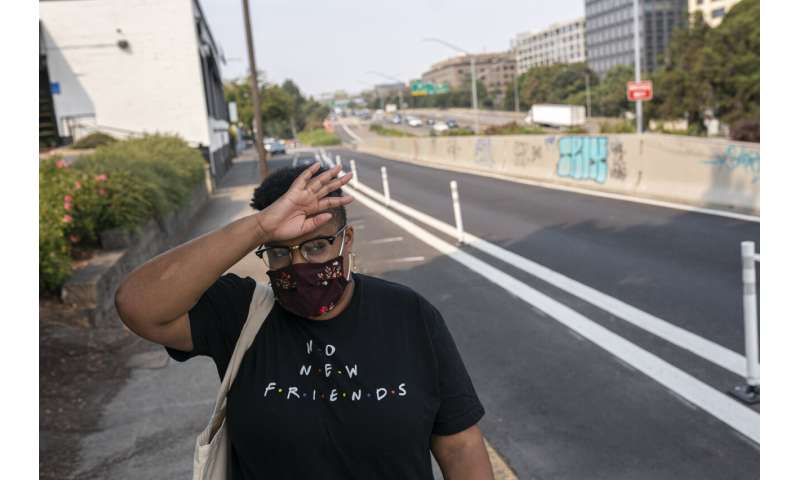

Katherine Morgan wipes sweat from her forehead while walking to work in high temperatures on Thursday, Aug. 12, 2021, in Portland, Ore. People have headed to cooling centers as the Pacific Northwest began sweltering under another major, multiday heat wave. Credit: AP Photo/Nathan Howard
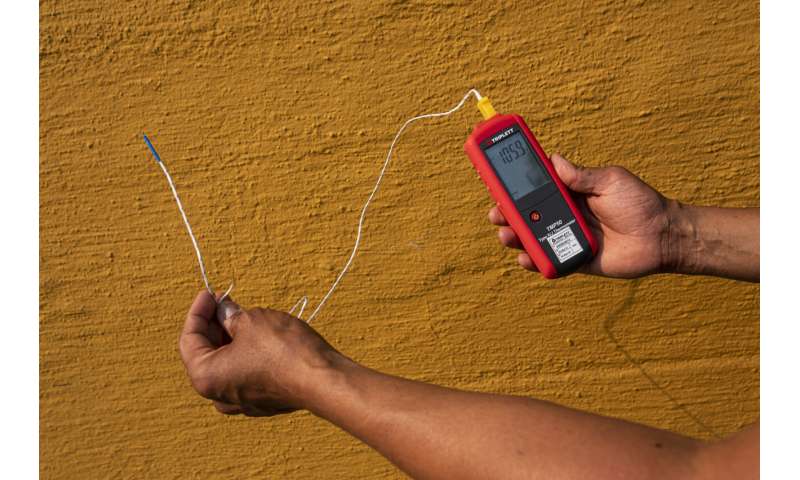

Vivek Shandas, a professor of climate adaptation at Portland State University, takes a temperature reading of almost 106 degrees in downtown Thursday, Aug. 12, 2021, in Portland, Ore. People have headed to cooling centers as the Pacific Northwest began sweltering under another major, multiday heat wave. Credit: AP Photo/Nathan Howard
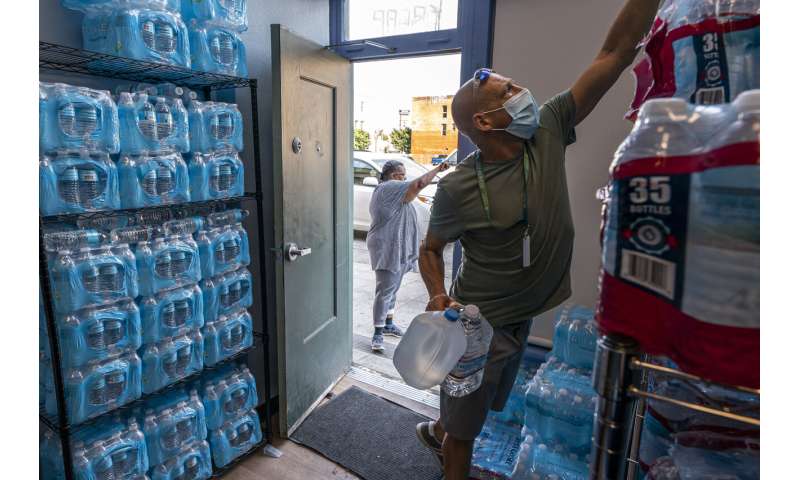

Chris Cowan with Cascadia Behavioral Healthcare's street outreach team loads water and other cooling supplies before visiting homeless camps on Thursday, Aug. 12, 2021, in Portland, Ore. Credit: AP Photo/Nathan Howard
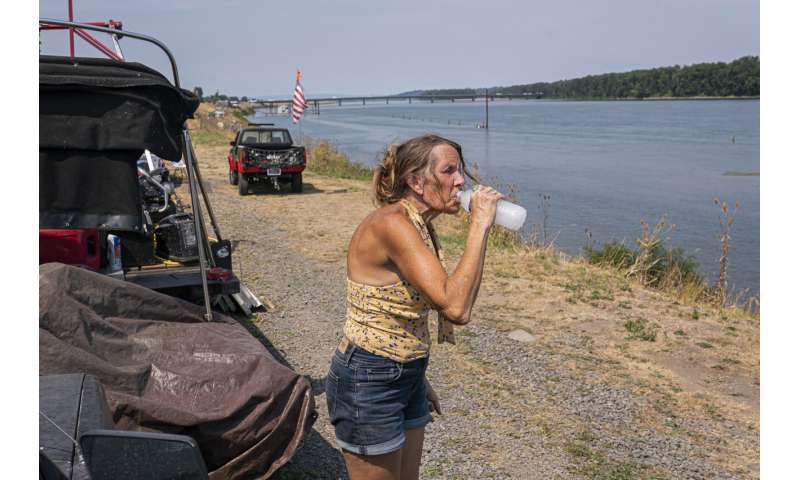

A woman living along the Columbia River who declined to be named, drinks a bottle of water delivered by Cascadia Behavioral Healthcare's street outreach team on Thursday, Aug. 12, 2021, in Portland, Ore. Credit: AP Photo/Nathan Howard
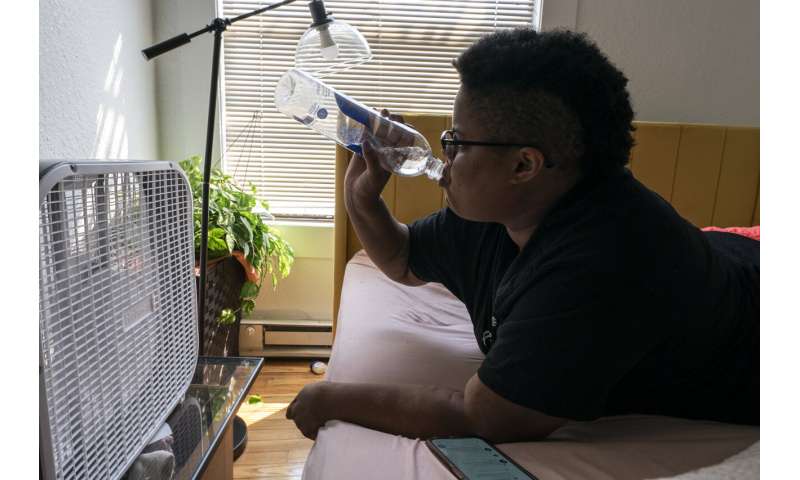

Katherine Morgan drinks water in front of a box fan while trying to stay cool in her downtown apartment without air conditioning on Thursday, Aug. 12, 2021, in Portland, Ore. People have headed to cooling centers as the Pacific Northwest began sweltering under another major, multiday heat wave. Credit: AP Photo/Nathan Howard
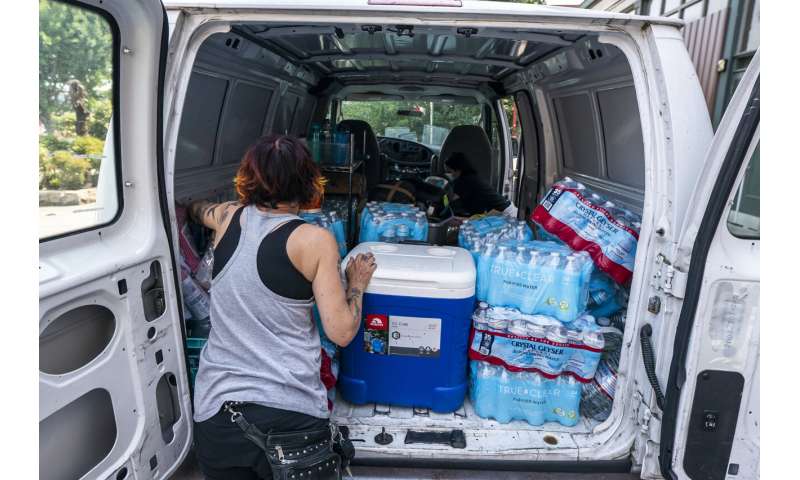

Cascadia Behavioral Healthcare's street outreach team loads water and other cooling supplies before visiting homeless camps on Thursday, Aug. 12, 2021, in Portland, Ore. Credit: AP Photo/Nathan Howard
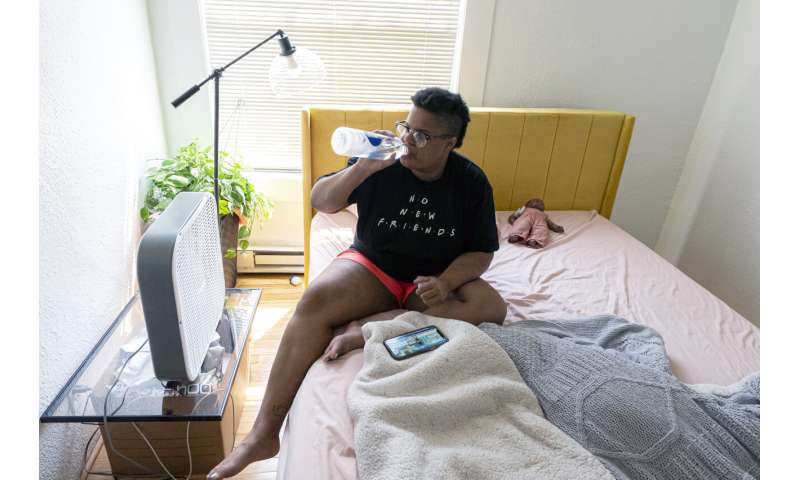

Katherine Morgan drinks water in front of a box fan while trying to stay cool in her downtown apartment without air conditioning on Thursday, Aug. 12, 2021, in Portland, Ore. People have headed to cooling centers as the Pacific Northwest began sweltering under another major, multiday heat wave. Credit: AP Photo/Nathan Howard


A fan at T-Mobile Park adjusts a cloth on his head during a sunny day baseball game between the Seattle Mariners and the Texas Rangers, Thursday, Aug. 12, 2021, in Seattle. The usually temperate Pacific Northwest region entered the peak days of a scorching heat wave Thursday. Credit: AP Photo/Ted S. Warren
People experiencing homelessness are often reluctant to go to cooling centers, said Kim James, director of homeless and housing support for Cascadia Behavioral Healthcare, a nonprofit group that serves the homeless and those with mental illness.
Scott Zalitis, who was shirtless in the heat, ate lime-green popsicles handed out by the group Thursday and told volunteers that the temperature at his campsite reached 105 F (41 C) the day before.
"It's miserable. I can't handle the heat no matter what. So, I mean, it's hard to stand. Even in the shade it's too hot," Zalitis said. "You want to stay somewhere that's cool, as cool as possible."
The encampment, where rusted-out cars and broken-down RVs mixed with tents and piles of garbage, was in sharp contrast to downtown Portland, where sweaty pedestrians cooled off by running through a large public fountain in a riverfront park.
Explore further Northwest sizzles as heat wave hits many parts of US
© 2021 The Associated Press. All rights reserved. This material may not be published, broadcast, rewritten or redistributed without permission.
Scott Zalitis, who was shirtless in the heat, ate lime-green popsicles handed out by the group Thursday and told volunteers that the temperature at his campsite reached 105 F (41 C) the day before.
"It's miserable. I can't handle the heat no matter what. So, I mean, it's hard to stand. Even in the shade it's too hot," Zalitis said. "You want to stay somewhere that's cool, as cool as possible."
The encampment, where rusted-out cars and broken-down RVs mixed with tents and piles of garbage, was in sharp contrast to downtown Portland, where sweaty pedestrians cooled off by running through a large public fountain in a riverfront park.
Explore further Northwest sizzles as heat wave hits many parts of US
© 2021 The Associated Press. All rights reserved. This material may not be published, broadcast, rewritten or redistributed without permission.
No comments:
Post a Comment